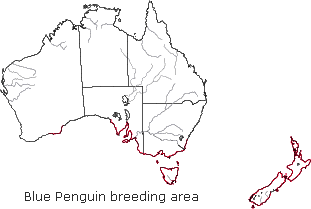Kingdom: Animalia
Phylum: Chordata
Class: Aves
Order: Sphenisciformes
Family: Spheniscidae
Genus: Eudyptula
Species: E. minor
Binomial name: Eudyptula minor
Common name: Blue Penguin, Little Blue Penguin, Maori name: Korora
The Blue Penguin (Eudyptula minor) is the world's smallest species of penguin. They stand at 30cm tall, weigh around 1000g as an adult, tall and is found on the coastlines of southern Australia and all around New Zealand, with possible records from Chile.
In New Zealand, they are also called Little Blue Penguins owing to their slate-blue plumage. The Blue Penguin breeds along the entire coastline of New Zealand, the Chatham Islands and the southern Australian coast. In the wild, they live about 8 years but in sanctuaries, there are birds that are still breeding who are 16 years old.
There are several things that are unique to the blue penguin: It is coloured blue with a white chest. It walks on land with a forward stoop and It has no other colour or crest on its head,
They forage at sea between dawn and dusk. It can dive up to a depth of 30 m. In water, a penguin propels itself with its flippers and steers with its tail and rear feet. A Little Blue Penguin rests on the water’s surface by stretching its flippers for stability.
The feathers of the penguin are small and densely-layered, providing insulation against the cold ocean. Oil released from a gland at the base of the tail is spread over the feathers, providing a waterproof coating. Moulting takes place in late summer and autumn and lasts for between 15 and 20 days. During this time, the penguin’s feathers are not waterproof, and the bird must remain out of the water.
Breeding pairs do not appear to meet at sea, yet they successfully synchronise their occasional visits to burrows prior to breeding.
There are six subspecies. Here are their names and locations.

Little blue penguin coming ashore at 9.00pm November.

